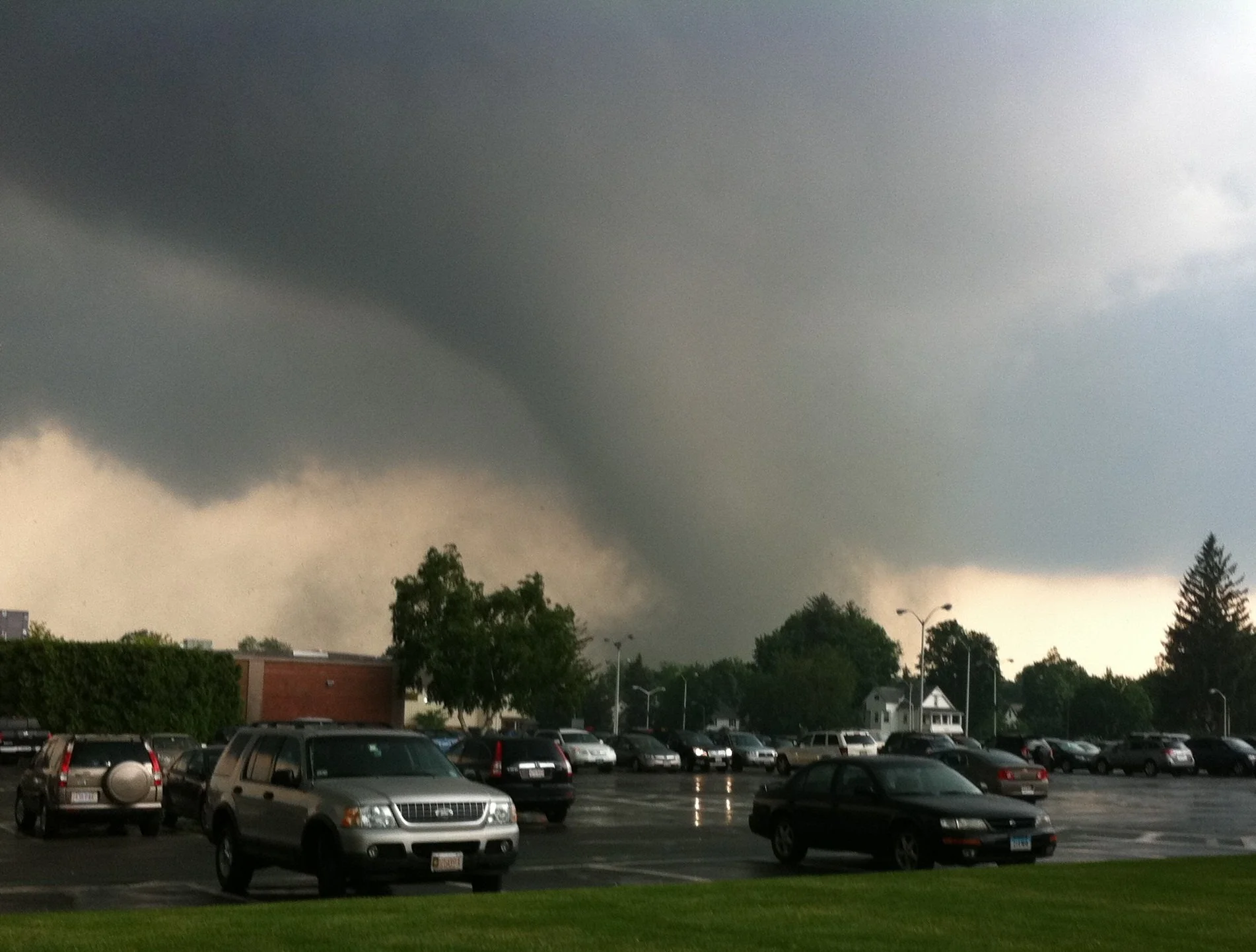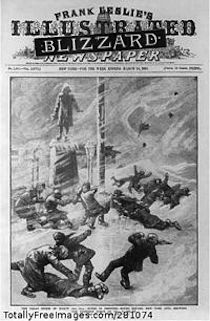
Who makes this stuff?
The June 1, 2011 tornado that killed three people in and around Springfield, Mass.
— Photo by Runningonbrains
“I reverently believe that the Maker who made us all makes everything in New England but the weather. I don’t know who makes that, but I think it must be raw apprentices in the weather clerk’s factory who experiment and learn how, in New England, for board and clothes, and then are promoted to make weather for countries that require a good article, and will take their custom elsewhere if they don’t get it….’’
–Mark Twain (1835-1910)
Todd McLeish: Is weird weather El Nino, global warming or both?
From ecoRi News (ecori.org)
The weather this winter in southern New England has been far from typical, and it’s having serious implications for wildlife and natural history phenomena.
The official temperature at Rhode Island's T.F. Green Airport on Feb. 1 reached 66 degrees Fahrenheit, a record high for the date, But two weeks later, on Valentine’s Day, it plunged to minus 9, the coldest temperature in Rhode Island in more than three decades. A week later, it was back in the 60s again.
On Feb. 24, the National Weather Service issued a severe thunderstorm warning, the first time it has ever done so in February. That follows a warmer-than-usual January and record warmth in December.
The periods of warm weather in February triggered daffodils, crocuses and other early-blooming flowers to sprout a month or more before they usually do. Wood frogs and spring peepers were observed hopping across roads and chirping loudly in vernal pools in many locations during the last week of February, which is also several weeks earlier than usual.
On Feb. 25, Keith Killingbeck, a professor of botany at the University of Rhode Island, noticed a red maple tree with flower buds expanding, nearly two months early.
If the weather remains warm, these plants and animals shouldn’t experience any ill effects. But what will happen if a freeze returns, as it often does in March?
“Early spring plants are pretty tolerant of cold temperatures,” Killingbeck said, “but it depends on how cold it gets and how long those cold temperatures last. It’s in the realm of possibility that flowers could pop open, bloom and get zapped by a long, cold frost and be toast for the season. A lot of trees are susceptible, too. That’s a lot of energy the plants and trees expend for nothing.”
Killingbeck said that such an event wouldn’t affect the survival of the plants, but it eliminates an entire year of reproduction.
Frog and salamander reproduction could be affected, too. In a typical year, evening rains in mid- to late March trigger wood frogs, spring peepers and spotted salamanders to migrate from their wintering locations among the leaf litter and in shallow burrows to temporary pools and small ponds, where they mate and lay their eggs. But the warm weather in late February triggered some to begin their migrations several weeks early. The return of winter conditions in March could jeopardize any eggs that have already been laid.
Lou Perrotti, director of conservation programs at Roger Williams Park Zoo and an expert on reptiles and amphibians, said wood frogs are especially cold hearty and will hunker down until the weather is just right.
“The males arrive [in their breeding ponds] first and start calling the girls down, but if it is too cold they will not call and the girls will not move,” he said. “So breeding won’t happen until the temperatures and precipitation are optimal.”
It’s not unusual for a thin layer of ice to form on amphibian breeding ponds after the frogs and salamanders have laid their eggs, according to URI herpetologist Peter Paton. Some eggs may die as a result, he said, but those submerged below the surface should survive. Adult frogs are usually able to avoid being trapped under the ice by exiting the pond.
Paton does worry, however, about repeated cold and warm spells in March. Wood frogs and spring peepers survive the winter by slowing their metabolism, dropping their body temperature, and allowing the water in their bodies to freeze solid. They survive unharmed thanks to the production of a concentrated sugar solution that acts as an anti-freeze to protect their organs.
“But I don’t know how many times they can withstand freezing and thawing in one season,” he said. “They might not do well if they have to keep doing it.”
Plants and amphibians aren’t the only wildlife that seems to be a bit confused by the weather. On Feb. 25, David Gregg, executive director of the Rhode Island Natural History Survey, posted a video on Facebook of a group of bees swarming around his bird feeder. He said it appeared as if the bees were licking the sunflower seeds.
“I understand that one of the concerns about global warming is the mismatch between bees and flowers,” he said. “The bees are active because the weather's warm, but there aren’t any flowers out yet for them. So maybe that causes them to go after alternative food sources such as my bird seed.”
Climate change may well be playing a role in the unusual weather this year, but also playing a role is this year’s strong El Nino, which changes weather patterns in complex and unpredictable ways.
“This overriding element of global warming is impacting everything on our planet,” Killingbeck said, “and then on a little less universal scale, the El Nino year on top of that is messing with certain pockets of the globe as well.”
But he said that all is not lost for this year. At least not yet.
“We’re at a critical time right now,” Killingbeck said. “It all depends on what happens in the next month. It could still get back to normal. If we get back to more seasonable temperatures in March, the plants should do what they usually do in spring. Or we could have 70 degrees in March and all bets are off.
“But just because we’ve had a wacky winter doesn’t necessarily mean we won’t have a normal spring.”
Rhode Island resident and author Todd McLeish runs a wildlife blog.
Chris Powell: Weather instead of news; hypocritical pope
MANCHESTER, Conn.
While "global warming" hasn't changed Connecticut's climate that much, local television news here lately seems to be much less about news and more about weather.
To people who try to take local TV news seriously, this is sometimes comic, as when the forecast for the week ahead is essentially uneventful and unchanging but is belabored and repeated. The local TV news format of weather emphasis suggests that most of the audience goes through day after day without access to a window.
But taking local TV news seriously is probably a mistake. The TV stations themselves must know better; they have market research. If people really wanted to know what was going on around them they'd read newspapers, from which a big part of local TV news is taken anyway without the courtesy of attribution.
So instead local TV news viewers, who generally constitute a statewide rather than merely local audience, are told at great length about things that are relatively far from them, have no impact on them, and about which they can do nothing -- a fire in Meriden, a fatal traffic accident in Waterbury, a holdup in Norwich, a shooting in Bridgeport, a hit-and-run in Norwalk, a flasher in Bristol, a drug bust in New Haven, and a molestation arrest in Putnam, the latter complete with five minutes of interviews with people on the street who know nothing about the case but are willing to speculate on what should be done with the defendant if he's guilty, or even if he's not.
Then in the 10 seconds remaining before the next installment of the weather forecast (which is the same as it was minutes earlier), viewers might be told that the next state budget is coming up a billion dollars short, indicating lots of tax increases and spending cuts affecting everyone, but about which viewers will be left to guess, unless they want to bother with the papers.
Yet as life gets harder, real incomes and living standards fall, voter participation collapses, literacy fades, and college degrees signify less learning than high-school diplomas once did, why should anyone care? Few people are slogging home through rush-hour traffic thinking: "As soon as I get inside I'll be able to read about public policy!" Of course, most are thinking only of dinner and getting away from the grind for a few hours before having to return to it.
The musicians Donald Fagen and Walter Becker of Steely Dan saw it coming 40 years ago in "Only a Fool Would Say That":
The man on the street
Dragging his feet
Don't want to hear the bad news.
Imagine your face
There in his place
Standing inside his brown shoes.
You do his 9 to 5,
Drag yourself home half alive,
And there on the screen,
A man with a dream.
The old complaint is that everybody talks about the weather but nobody does anything about it. But if anything ever could be done about it, it might disappear from local TV news, having become a matter of public policy requiring the greater expense of journalism.
xxx
Trying to make nice with Muslims, who lately have been getting some bad publicity, Pope Francis remarked the other day that people shouldn't insult or ridicule the religion of others. But that would be to change the rules in the middle of the game while one is ahead.
After all, Judaism, Christianity and Islam didn't ascend by being respectful to what the Book of Daniel recalls as "the gods of gold, and of silver, of brass, of iron, of wood, and of stone," the old idols. Those gods are out of business precisely because the pope's predecessors insulted and ridiculed them, and worse.
Chris Powell is managing editor of the Journal Inquirer, in Manchester, Conn.
January thaw
Jan. 25, 2014 A windy, mild and sweetly melancholic day with scudding clouds from the southwest. Snow and ice are melting without man-made stimulants. Once again I'm rather surprised and pleased by how the light is brighter in late January than even just a couple of weeks before, and by the power of even the winter sun to quickly heat us in sheltered places. Our unheated but glassed-in sleeping porch, which faces the south, gets up to 75 even when it's 15 outside. We use the space to heat the adjoining bedroom by day.
We New Englanders could do a lot more with passive solar heating. It's not as if we're that far north; we're at the latitude of Portugal.
One nice thing about aging is that while the cold itself is harder to take, especially the windy chill of Northeast coastal cities, you're ever more aware of how fast time goes -- it will be spring very soon. And while it has seemed recently that we're living on Hudson's Bay, actually we're much closer to the Gulf Stream.
In New England, more than in most places, we have the weather to help mark off sections of our lives, as an aide-memoire, and that's handy. Now we have the predictable "January thaw,'' which, though this one will be very brief, reminds us that our weather won't really be paralyzed by the likes of "polar vortexes'' or other such Weather Channel monsters. By the way, California is having record heat and drought. And Alaska has been pretty warm for, well, Alaska.
Scientists differ on why the rise in temperatures associated with the "January thaw' ' tends to happen in late January rather than in early February, which would seem to make more sense. In any case, I'm more vulnerable to the sadness from lack of light than from the cold. And the light is moving in the right direction.
comment via rwhitcomb51@gmail.com






